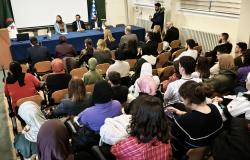Impact of RESILIENCE

EU funded projects like RESILIENCE are expected to have an impact. But what is that impact and how does RESILIENCE intend to achieve it? Read here how Dženana Husremović and Jelena Brkić Šmigoc (University of Sarajevo) perceive that impact and how they are working to accomplish it.
Dženana and Jelena, what do you understand in general by the impact of a Research infrastructure?
The impact of a Research Infrastructure (RI) refers to the measurable and often far-reaching effects that result from the existence and operation of the RI in the scientific, societal, and economic domains. There are several impact areas RESILIENCE is focusing on: scientific impact, social and societal impact, international collaboration and reputation impact, education and training impact and policy and governance impact.
Can you give an example of how RESILIENCE generates impact and how you measure it?
RESILIENCE is the complex infrastructure in which we train and support researchers in Religious Studies. Digital services, such as new technologies for text recognition and translation of manuscripts will contribute directly to creative and innovative ways of doing research. Measuring the impact of RESILIENCE involves a combination of quantitative and qualitative indicators, surveys, case studies, and collaboration with stakeholders to comprehensively assess the influence of the infrastructure in advancing the field of Religious Studies through digital means.
How are you working on that impact so far?
Impact is one of the work-packages (sub projects) of RESILIENCE. The University of Sarajevo’s task is to deliver an impact analysis. One of the first steps is to develop a methodology for analysis and to identify the areas of impact for religious studies. We already have had two online workshops on the design of an impact assessment matrix with indicators, resulting in quite a lot of input. During an in person workshop in March of this year, we will refine and further develop the matrix.
***
Jelena Brkić Šmigoc is Docent/Assistant Professor at the Faculty of political sciences University of Sarajevo.
Dženana Husremović is vice rector for Teaching and Student Affairs at the University of Sarajevo.








